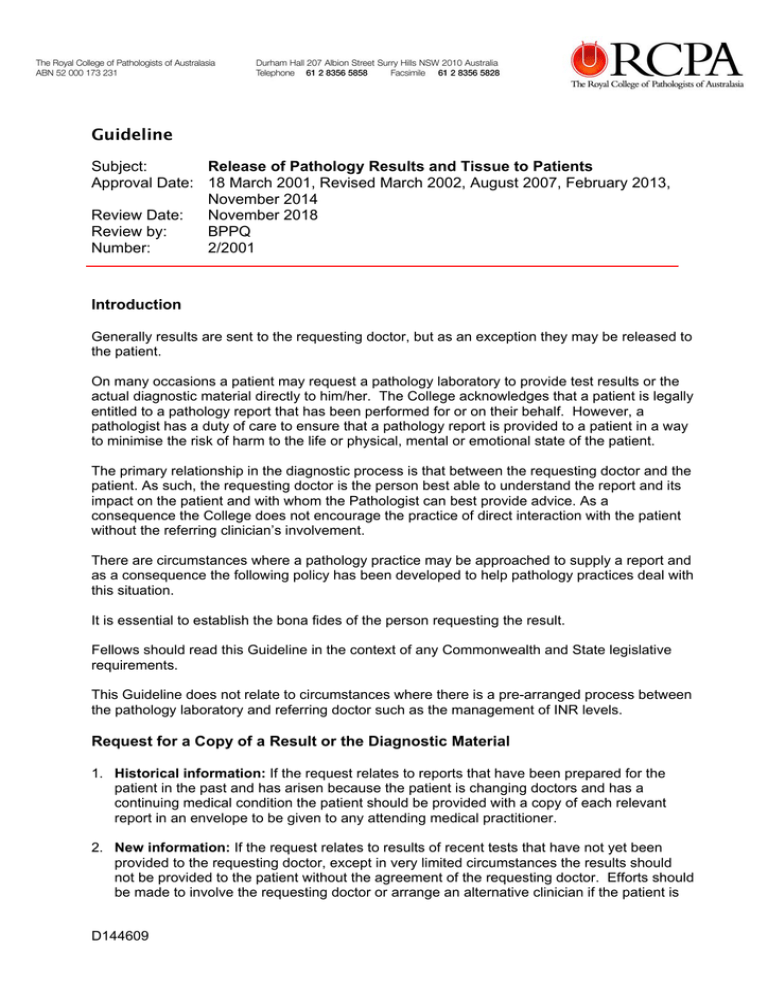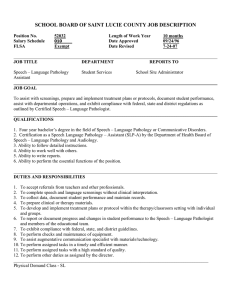Guideline
advertisement

Guideline Subject: Release of Pathology Results and Tissue to Patients Approval Date: 18 March 2001, Revised March 2002, August 2007, February 2013, November 2014 Review Date: November 2018 Review by: BPPQ Number: 2/2001 Introduction Generally results are sent to the requesting doctor, but as an exception they may be released to the patient. On many occasions a patient may request a pathology laboratory to provide test results or the actual diagnostic material directly to him/her. The College acknowledges that a patient is legally entitled to a pathology report that has been performed for or on their behalf. However, a pathologist has a duty of care to ensure that a pathology report is provided to a patient in a way to minimise the risk of harm to the life or physical, mental or emotional state of the patient. The primary relationship in the diagnostic process is that between the requesting doctor and the patient. As such, the requesting doctor is the person best able to understand the report and its impact on the patient and with whom the Pathologist can best provide advice. As a consequence the College does not encourage the practice of direct interaction with the patient without the referring clinician’s involvement. There are circumstances where a pathology practice may be approached to supply a report and as a consequence the following policy has been developed to help pathology practices deal with this situation. It is essential to establish the bona fides of the person requesting the result. Fellows should read this Guideline in the context of any Commonwealth and State legislative requirements. This Guideline does not relate to circumstances where there is a pre-arranged process between the pathology laboratory and referring doctor such as the management of INR levels. Request for a Copy of a Result or the Diagnostic Material 1. Historical information: If the request relates to reports that have been prepared for the patient in the past and has arisen because the patient is changing doctors and has a continuing medical condition the patient should be provided with a copy of each relevant report in an envelope to be given to any attending medical practitioner. 2. New information: If the request relates to results of recent tests that have not yet been provided to the requesting doctor, except in very limited circumstances the results should not be provided to the patient without the agreement of the requesting doctor. Efforts should be made to involve the requesting doctor or arrange an alternative clinician if the patient is D144609 agreeable. The circumstances in which results can be disclosed to a patient without the agreement of the requesting doctor should be set out in the pathology practice’s policy having regard to the duty of care that is owed to the patient. Please see comments below on requests for the release of results. 3. Although a patient may be entitled to results of a pathology report, that patient is not entitled to any materials that may have been used by the pathology practice in preparing those results or that report. 4. In the event of a patient’s insistence that all material be provided, the problem should be resolved in accordance with the policy of the Practice. Legal advice should be sought if there are any concerns. Request for Release of Results 1. In general, pathology results should be supplied to the practitioner who requested the tests so that appropriate clinical interpretation and advice is given in the context of the patient’s clinical history, presenting symptoms and signs. It is reasonable to provide copy results to patients when requested by the requesting practitioner. 2. Where a patient requires that a pathology practice disclose results to them: • y the pathologist in charge should have regard to the duty of care that is owed to the patient AND if the disclosure is justified the results content should be made available to the patient by an appropriate member of the staff. 3. Where results are to be disclosed as provided for in 2 above: • • the results must be in writing AND a reasonable attempt should be made to advise the requesting doctor. 4. In this circumstance the pathologist should keep documentation of any discussion with the patient. 5. Where possible the requesting practitioner should be notified that the patient has requested the results directly and be provided with the same information as that which was provided to the patient. 5. Laboratories must be alert to identity fraud. It is advisable that if there is any concern that the person requesting the results is not the patient, the person should attend so that photographic identification can be undertaken. 6. Results must not be provided to anyone other than the patient (for example to employers or relatives (with the exception of parents or legal guardians where applicable) without the written consent of the patient concerned. Reasonable steps should be taken to maintain patient confidentiality at all times in accordance with the Privacy Act 1988 (Cth). 2

